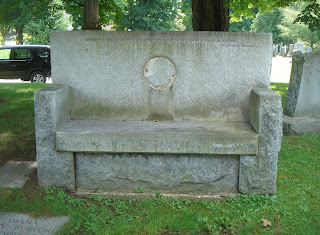 |
| The Globe, 10 December 1923 |
Three men feature on the first page of the 1923 'Recent Books and the Outlook,' the 'Globe 100' of its day. The first, Paul A.W. Wallace, is recognized for his debut, Baptiste Larocque: Legends of French Canada. The second man, W.J. Healy, wrote Women of Red River, which was "arranged and published under the Women's Canadian Club of Winnipeg by Russell, Land, and Company." Norris Hodgins, the third, was recognized for Why Don't You Get Married.
All three are Canadian and all three are new to me.
I've been following the Globe's century-old lists of best books for nearly a decade now, and so think I know what to expect. There will be a dour pronouncement – in this case, "there is a dearth of outstanding books, especially novels, at the present time" – which will, in turn, be counterbalanced by something of a positive nature:
Under the 'More Canadiana' banner are books by Americans LeRoy Jeffers, Charles Towne, John M. Clarke, Charles W. Stokes, Paul Leland Haworth, and Briton Wilfred Grenfell. The final ingredient in this messy mix is George King's self-published Hockey Year Book. Its inclusion marks the first ever mention of the sport in 'Recent Books and the Outlook.'
I can't imagine how much it would fetch today. 84 Victoria Street itself is worth a bloody fortune.
Despite the flag waving, Canadian writers don't fair all that well in the Globe's 1923 list, accounting for just 46 of the 196 titles featured. As in 1922, poets dominate:
Ballads and Lyrics - Bliss CarmanSelected Poems - W.H. Davies*Morning in the West - Katherine HaleFlint and Feather - E. Pauline JohnsonThe Complete Poems of Archibald LampmanShepard's Purse - Florence Randal LivesayThe Miracle Songs of Jesus - Wilson MacDonaldThe Complete Poems of Tom MacInnesThe Songs of Israfel and Other Poems - Marion OsborneThe Garden of the Sun - A.E.S. SmytheThe Empire Builders - Robert SteadWoman - Albert Durrant Watson
That's twelve titles! From a nation of nine million! The Globe informs that the rest of the world produced just five collections of note!
For the second year running, we have the inclusion of The Complete Poems of Archibald Lampman, of which there is no record. And so, for the second year, I'll suggest that what is being referred to is The Poems of Archibald Lampman, first published in 1900 by George N. Morang. As Ryan Porter notes, the collection enjoyed several reprints. Still, I see no evidence of a new edition in 1923, never mind 1922. I'll say the same of E. Pauline Johnson's 1912 Flint and Feather. There was a new edition of Robert Stead's The Empire Builders, which just happens to be the only poetry title I own.
Our non-fiction writers fare the worst with just four of the fifty titles listed. I don't have a copy of even one, though I am interested in the Marjorie Pickthall, "a memorial volume edited by Helena Coleman," which does not seem to exist.
Our writers of fiction don't fare much better, contributing just eight titles to the list:
There were twenty-one Canadian works of fiction on the 1922 list.
Here are some that made it:
And here are some that did not:
Frank L. Packard's The Four Stragglers is at the bottom of the pile, Stephen Leacock's Over the Footlights is at the top. Between the two is Winnifred Eaton's "Cattle" – or is it Cattle? – which may just be the best Canadian novel of 1923.
The Gaspards of Pine Croft, which I've not read, is one of my $2 Connors.
I've long been on the lookout for Beaumont S. Cornell's lone novel Lantern Marsh because it's set in a thinly disguised Brockville, Ontario, which is where I do my weekly grocery shopping.
Basil King's novel The Happy Isles is praised as the best since his 1909 breakthrough The Inner Shrine. I do like it, but nowhere near as much as The Empty Sack (1921).
I was once engaged to a woman who knew a woman who had been engaged to Harwood Steele.
And so it goes.
* Correction: Roger Allen writes, "Are you sure the dozen poets are Canadian? The W.H. Davies nearly everyone thinks of - still in print - is the author of The Autobiography of a Super-Tramp. He only became a poet because he lost a leg jumping on a train in Canada and had to go back to Britain, but that doesn't make him Canadian."
He's correct, of course. I can't explain the error, though it might have something to do with a bottle of Canadian Club sent by an aunt as an early Christmas gift.































